
Food Entrepreneurship, Excess, Applied Science and Technology Initiative
FEEAST
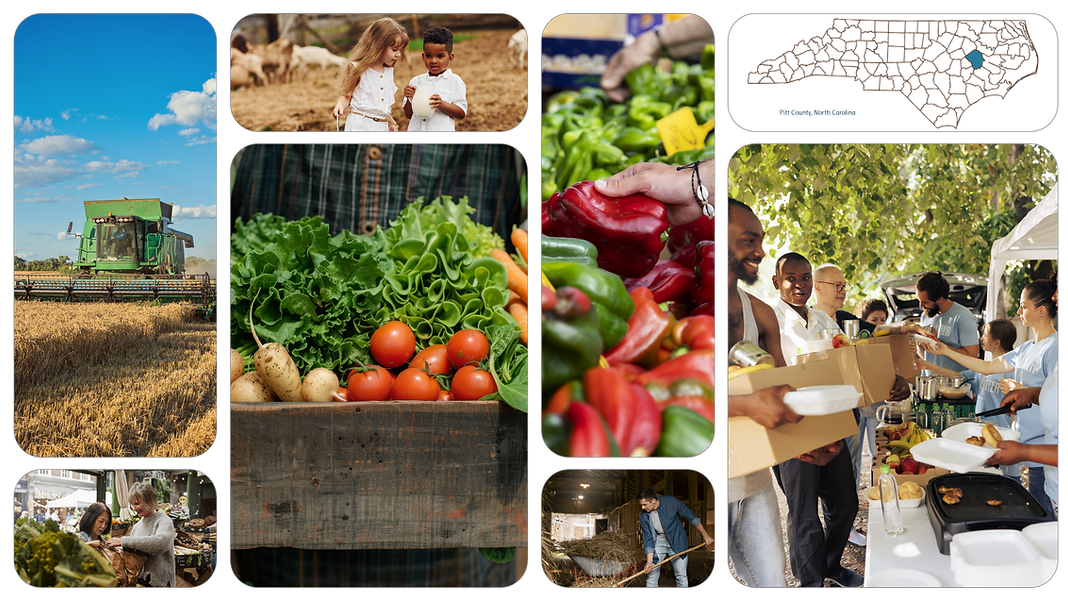
Smörgåsbord GVL:
Emerging Issues and Entrepreneurial Opportunities in the Local Food System of Greenville and Pitt County, NC
TABLE OF CONTENTS
Acknowledgements
I want to thank Zac Hackney for his support in connecting me with the Pitt County Farm and Food Council and for sharing his insights about the local food environment.Thank you to the Pitt County Farm and Food Council members for letting me participate in your meetings and interview members and providing feedback on the assessment drafts. Your collaboration has been crucial to this project.
A special thanks to Dee Dinsdale, Kahla Hall, Hillary Gallagher, Matt Stevens, Taneisha Armstrong, Will Brown, Mary Worsley, Anne Parker Chambliss, JT Tyndall, Brandon Garris, and the local food hub operators for participating in the interviews. Your input has been invaluable.
I also want to thank Napoleon Wallace for recognizing the need for an updated assessment and his efforts to advance food justice efforts in the community.
Finally, I appreciate the Gold Post Commissary Kitchen for commissioning this assessment. Your support made this project possible.
Thank you all for your help and dedication to improving the Pitt County food environment.
Dr. Olivia Whitt
Dr. Olivia Whitt is an experienced educator and researcher in Health Promotion, Education, and Behavior. She earned her Doctorate from the University of South Carolina and currently teaches at the University of North Carolina’s MPH@UNC program, East Carolina University’s Health Education and Promotion program, and East Carolina University’s Master of Public Health program. Dr. Whitt has a strong background in community nutrition, having helped complete the Assessment of Pitt County's Community Food System in 2016 and evaluate South Carolina’s SNAP-Ed policy, system, and environmental changes.
Researcher

Background
This assessment is based on the six different categories of the food system (Justice and Fairness, Strong Communities, Vibrant Farms, Healthy People, Sustainable Ecosystems, and Thriving Local Economies) outlined in the Whole Measures for Community Food Systems framework, which was designed by the Community Food Security Coalition in 2009. Initially completed in 2016, the data indicators in this assessment were chosen to create a baseline measurement of a community’s food system. The analysis is meant to provide broad ideas around strengths, opportunities, weaknesses, and threats to help inform the Pitt County Farm and Food Council as it engages in strategic planning around food system development. Overall, this assessment is designed to encourage people to think about food, agriculture, and community health from a whole systems perspective. The 2024 assessment seeks to update those measures and highlight trends or changes since 2016. Data was collected from secondary sources like the Census/NC Agriculture Census, County Health Rankings, and ECU Health. In addition, qualitative interviews were conducted with food council members to better understand how these local food systems interact.
Introduction

The Pitt County Food and Food Council (PCFFC) is working to establish and maintain relationships among diverse organizations and community members to strategically shift our food system to one more supportive of the local community. Food Councils include representatives from all parts of the local food supply chain, which provides an opportunity to address community food system betterment on a macro level.
Pitt County Farm and Food Council Mission:
The Pitt County Farm and Food Council promotes a healthy, sustainable, equitable and economically viable community food system. By fostering a network, we initiate, support, and promote programs and policies that educate the community, diminish food disparities, and protect farmland.
Pitt County Farm and Food Council Vision:
Our vision is for Pitt County to be an informed, engaged, and healthy community with access to nutritious food and a commitment to continuously improving our community food system.
So, to better understand our community food system, Olivia Whitt, a professor and researcher at East Carolina University, with the help of PCFFC members, completed this assessment in May 2024. Members of the PCFCTF represent several sectors of the local food system with representatives from local farming, ECU Health, NC Cooperative Extension, the Food Bank of Central and Eastern NC, the Pitt County Health Department, Aramark at ECU, Veteran’s Affairs, and the religious community.
What is a Food System Assessment?
Values
Communities
People
Farms
A food system assessment is a collaborative process that examines a broad range of food system-related data to inform actions for improving a community’s food system.
The process of conducting a food assessment involves identifying the specific quantitative data points to collect, collecting the quantitative data, confirming quantitative data trends with stakeholder interviews, developing a system for organizing the data, sharing the findings, and using the findings to guide future planning and decision-making. Our assessment for Pitt County uses the Whole Measures for Community Food Systems framework. This is intended to encourage community members to think about Pitt County’s food system from a whole systems perspective. The specific data indicators that were collected are organized into the following whole measures: Vibrant Farms, Community Health, Sustainable Ecosystems,Thriving Local Economies, Strong Communities, and Justice and Fairness. The analysis portion of the assessment outlines strengths, weaknesses, opportunities and threats facing the different parts of Pitt County’s community food system.
A food assessment is a relatively quick way to create a shared understanding of the realities of Pitt County’s food system. This assessment was not intended to be extensive or comprehensive, but rather, serve as a way to start telling the story of what is going well, what is not going well, what changes have been made, what trends are apparent, and what measures are still needed to tell the story of Pitt County’s community food system.
The purpose of this food system assessment was to engage key stakeholders in an analysis of Pitt County’s community food system. We believe that this baseline assessment has the potential to result in many positive changes in our community by:
Fostering an awareness and understanding of our community food system;
Creating alignment, building connections, and encouraging collaboration across multiple sectors that influence our community food system
Guiding priority-setting, strategic planning, and decision-making
Identify strengths, weaknesses, opportunities and threats facing our community food system
Measuring progress, tracking change, and evaluating impact over time
Whole Measures for Community Food Systems Assessment Categories

Justice and Fairness
Fair food and farms come from food systems deliberately organized to promote social equality, justice, worker rights, and health through all activities. Achieving justice and fairness is an ongoing and evolving process involving many members of a community. It is a process that cultivates appropriate venues to recognize and dismantle unjust systems and that works to create alternative just systems.
A food system
that is just and fair:
1
2
3
4
Provides food for all
Reveals, challenges, and dismantles injustice in the food system
Creates just food system structures and cares for food system workers
Ensures that public institutions and local businesses support a just community food system.
-
49 official partners of the Food Bank that operate as a food pantry
-
More than 6 community gardens with a number of small gardens located in West Greenville (Census Tracts 7.01 and 7.02), the most economically disadvantaged census tracts in Pitt County
-
More than 175 SNAP retailers throughout the county
-
Leroy James Farmers Market accepts SNAP/EBT benefits and offers Double Bucks. With Double Bucks, SNAP participants can double their purchasing power for up to $20/visit/month.
-
Multiple faith organizations provide food to individuals with low socioeconomic status (SES)
-
Pitt County Schools Summer Meals program provides free breakfasts and lunches at 15 school sites to children regardless of income levels (5-site increase since 2016)
-
Pitt County has a federally funded educational program called EFNEP (Expanded Food and Nutrition Education Program). In 2023, 676 adults and youth participated and 82% of program participants improved their diet quality.
-
The Pitt County Council on Aging has a Meals on Wheels program which delivers meals to the home-bound elderly, ages 60 and over, who are unable to prepare their own meals and have no one else to do it for them.
-
Ripe for Revival, a mobile food market, sells in Greenville and Farmville every week
-
Veggies for Vets is a gardening program that provides fresh produce to a micro pantry within the Veterans Affairs Health Care Center for veterans in the area.
-
The Food Environment Index has increased since 2016 indicating that there is an increase in healthy food retailers compared to unhealthy food retailers within the county
-
Farmers Market reopened and is more accessible for those with disabilities
-
Since 2018, ECU has offered the William-Ross Purple Pantry which offers food and hygiene items for students in need
Partners Working in this Field
Pitt County Health Department
Provides clinical and community services to protect, promote, and assure the health of all people in Pitt County.
ECU Health
Provides medical care for 29 counties in Eastern North Carolina. Helps support local initiatives that benefit the health of the community.
Food Bank of Central and Eastern NC
A nonprofit organization that provides food for people that are food insecure in 34 NC counties.
East Carolina University
A public research university located in Greenville. Conducts public health and justice-related initiatives within the county.
More research
needed
Formal participant evaluation of food justice efforts like mobile markets and Fresh Bucks
Qualitative and quantitative data on barriers to receiving food assistance from those who are SNAP or WIC eligible
Food Access/Security
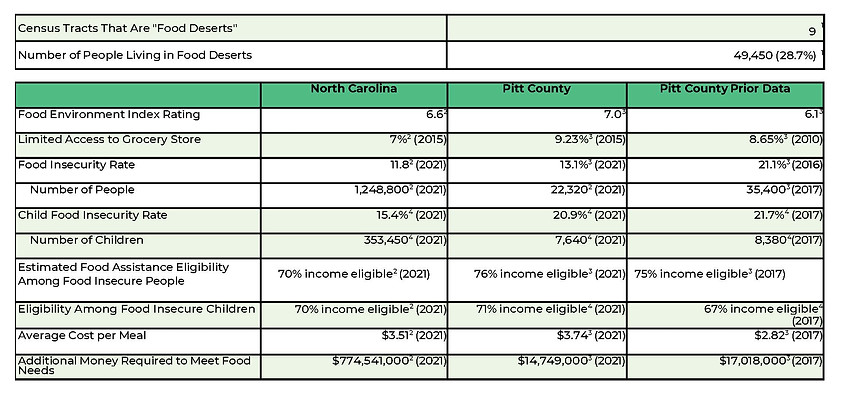
Food Assistance
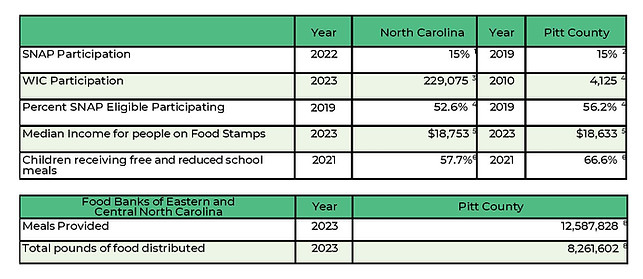
References
¹https://www.ers.usda.gov/data-products/food-access-research-atlas/go-to-the-atlas/
²https://www.ecuhealth.org/wp-content/uploads/2022/09/2022-Pitt-County-CHNA-Final.pdf
³https://fns-prod.azureedge.us/sites/default/files/resource-files/27wilatest-2.pdf
⁴https://www.ecuhealth.org/wp-content/uploads/2020/11/2019-Pitt-County-CHNA_FINAL.pdf
⁵https://statisticalatlas.com/county/North-Carolina/Pitt-County/Food-Stamps#overview
⁶https://datacenter.aecf.org/data/tables/2239-students-enrolled-in-free-and-reduced-lunch - detailed/2/any/false/1769,1696,1648,1603,1539,1381,1246,1124,1021,909/any/4682
⁷http://www.nutritionnc.com/wic/wicworks.htm
⁸https://foodbankcenc.org/about-us/locations-contact-info/greenville/

Strong Communities
Food can be a common and unifying force socially, culturally, and spiritually. A strong food system builds strong communities across class, race, age, education, and other social categories. Cultivating leadership from within a community and forging relationships based on characteristics such as trust, respect, and transparency can strengthen resilience, build capacity, and enhance engagement for change toward a shared vision of the whole community.
A food system that builds strong and resilient communities:
1
2
3
4
Improves equity and responds to community food needs
Contributes to healthy neighborhoods
Builds diverse and collaborative
relationships, trust, and reciprocity
Supports civic participation, political empowerment, and local leadership
-
Large Faith community, which not only increases social capital, but also the community engagement efforts within the county
-
Residents of Pitt County believe that the area is relatively safe and is good place to raise children
-
Policy developers and political leaders who are invested in the improved health of the county
-
Increased community-building efforts within the food system, like the Farm and Food Celebration event
-
Belvoir Elementary, Bethel School, Grifton School, Stokes School, Falkland Elementary, Northwest Elementary, and South Greenville Elementary have been awarded USDA Fresh Fruit and Vegetable grants. Students receive snack-size fresh fruits and vegetables along with direct nutrition education several times a week
-
ECU Sustainability and Love A Sea Turtle have developed gardens at several Pitt County schools and created a beehive at the Greenville Montessori School
-
Many community “champions” who want to spear-head health programs or otherwise serve the people of Pitt County
Partners Working in this Field
Pitt County Schools Child Nutrition
Program Provides nutrition education to children and families throughout the school year, in addition to a countywide summer feeding program.
Pitt Partners for Health
A community partnership with local representatives that are dedicated to improving the health of Pitt County residents.
ECU Health
Provides medical care for 29 counties in Eastern North Carolina. Helps support local initiatives that benefit the health of the community.
Immanuel Baptist Church
A food bank partner that provides boxes of food to those in need.
Love A Sea Turtle
A community garden and orchard that serves as a hub site for youth-led environmental initiatives.
More research
needed
Discover the resident awareness and use of community gardens, especially in West Greenville.
Identify variables and data sources that could serve as indicators of healthy neighborhoods, strong community-oriented schools, and faith communities
Create a database of food and nutrition community partners and services
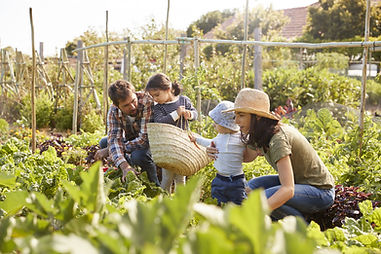
Healthy People
Community and individual health includes our physical, social, mental, emotional, and spiritual well-being. All of these dimensions are intrinsically connected to food and the food systems. For example, engaging with community members at farmers’ markets promotes our social connectedness. Learning to prepare our own food contributes to our mental development and enhances our resiliency. Growing food helps develop our physical and spiritual awareness as we connect to larger natural systems. Whole communities need whole people and community food systems that increase access to healthy food while also cultivating broader dimensions of health.
A food system
that promotes
healthy people:
1
2
3
4
Provides healthy food for all
Ensures the health and wellbeing of all people residing in Pitt County
Connects people and the food system, from farm to fork
Connects people to local farms and promotes health and wellness
-
ECU Health funds multiple programs that not only provide food, but also nutrition education
-
Pitt County’s Cooperative Extension offers Faithful Families, a package program that leverages faith-based organizations to teach a health and obesity prevention curriculum
-
Pitt Partners for Health is the county-wide collaborative that actively responds to the compelling health needs of Pitt County residents

Partners Working in this Field
Food Bank of Central and Eastern NC
A nonprofit organization that provides food for people that are food insecure in 34 NC counties.
ECU Health
Provides medical care for 29 counties in Eastern North Carolina. Helps support local initiatives that benefit the health of the community.
East Carolina University
A public research university located in Greenville. Conducts public health and justice-related initiatives within the county.
Pitt County Planning and Development
Develops and implements plans and policies related to land development to strengthen the sustainability of the county.
Pitt County Schools Child Nutrition Program Provides nutrition education to children and families throughout the school year, in addition to a countywide summer feeding program.
Pitt County Health Department
Provides clinical and community services to protect, promote, and assure the health of all people in Pitt County.
NC Cooperative Extension -
Pitt County
An extension of a state program that offers different opportunities to increase the profitability and sustainability of Pitt County’s food system.
More research
needed
Discover where residents are obtaining nutrition education
Healthy People
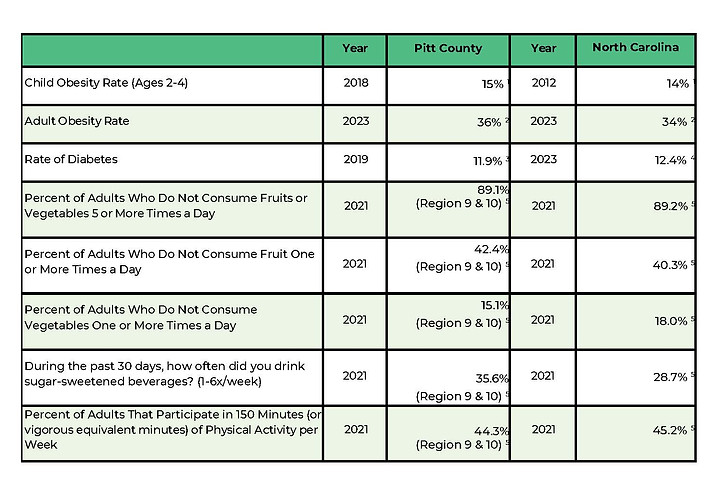
References
¹https://www.communityclinicalconnections.com/wp-content/themes/cccph/assets/downloads/panresources/CountyDataProfile_Pitt_by_PAN_Region_2018-1003.pdf
²https://www.countyhealthrankings.org/explore-health-rankings/north-carolina/pitt?year=2023
³https://healthycommunitiesnc.org/profile/geo/pitt-county#:~:text=Diabetes%20in%20the%20Region&text=In%202019%2C%20the%20percentage%20of,Pitt%20Tract%204%20(3.3%25).’⁴https://diabetes.org/sites/default/files/2024-03/adv_2024_state_fact_north_carolina.pdf
⁴https://schs.dph.ncdhhs.gov/data/brfss/2021/nc/nccr/DAILY_5.html

Thriving Local Economies
Thriving local economies depend upon the ecological integrity of the earth, its ecosystem, and species living within those ecosystems. Thriving local economies form decisions that ensure the well-being of future generations. They account for hidden costs in decision-making and work to build systems that regenerate output (wastes) into input (resources). Thriving local economies may utilize decentralized, participatory, and democratic processes designed to be informed by diverse community members and based upon a community’s assets.
A food system
that promotes thriving local economies:
1
2
3
4
Creates jobs and builds long-term economic vitality within the food system
Builds local wealth
Promotes sustainable development while strengthening local food systems
Includes infrastructure that supports community and environmental health
-
There is an increased demand for fresh, local, and organic produce
-
Restaurants are increasingly supplying their restaurants with more local foods and are interested in networking with Pitt County farmers
-
The development of Downtown Greenville’s Partnership has brought new businesses to the area, many of which are locally owned restaurants
-
Pitt County is part of the Visit NC Farms App which connects residents to local farms and markets

More research
needed
Discover barriers to local food supply at restaurants
Survey awareness of Visit NC Farm App
Thriving Local Communities

References
¹https://data.census.gov/profile/Pitt_County,_North_Carolina?g=050XX00US37147
²https://data.census.gov/profile/North_Carolina?g=040XX00US37
⁵ https://www.countyhealthrankings.org/health-data/north-carolina/pitt?year=2015
⁶ https://fred.stlouisfed.org/series/LAUCN371470000000005
⁷ https://fred.stlouisfed.org/series/NCPITT7URN
⁸ https://www.bls.gov/eag/eag.nc.htm#eag_nc.f.p
⁹ https://www.ers.usda.gov/data-products/food-environment-atlas/go-to-the-atlas.aspx
¹⁰ https://nutritionj.biomedcentral.com/articles/10.1186/1475-2891-13-1

Sustainable Ecosystems
Sustainable, balanced ecosystems are built upon interdependent relationships, depend upon clean air and water and healthy soil, and provide the foundation for all life. Developing whole communities and strong, just food systems means honoring this interdependence and enhancing ecological integrity through our actions. A sustainable food system depends upon a sustainable ecosystem and produces, processes, and distributes food in a way that supports and enhances rather than destroys ecological systems.
A food system
that supports sustainable ecosystems:
1
2
3
4
5
6
Sustains and grows a healthy environment
Promotes an ecological ethic
Enhances biodiversity
Promotes agricultural and food distribution practices that mitigate natural resources depletion
Enhance greater production with smaller environmental footprint
Promote profitability
-
Social consciousness, both politically and economically, for sustainability efforts in local food systems
-
Local farmers have utilized grants like the Environmental Quality Incentives Program (EQIP) through the USDA and Brighter Future Fund through the American Farmland Trust to integrate conservation efforts on their farmland
-
Food waste from small-scale markets and pantries is minimized and excess near-spoilage food is often donated to local animal farmers for feed

Partners Working in this Field
Pitt County Soil and Water Conservation District Works with USDA, Natural Resources Service, and other agencies to reduce soil and nutrient loss and drainage problems within the county..
Pitt County Planning and Development
Develops and implements plans and policies related to land development to strengthen the sustainability of the county.
Coalition for Healthier Eating
An organization that strives to educate consumers about the benefits of eating healthy and sustainably produced food.
USDA – Natural Resources Conservation Service
Provides US farmers with financial and technical assistance to voluntarily implement conservation efforts.
Terra Bella Compost
Offering residential and commercial composting services
NC Cooperative Extension - Pitt CountyAn extension of a state program that offers different opportunities to increase the profitability and sustainability of Pitt County’s food system.
USDA – Farm Service Agency
Administers farm commodity, crop insurance, credit, environmental, conservation, and emergency assistance programs for farmers.
More research
needed
Determine what sustainability practices restaurants and food supply stores are using
Reveal what assistance farmers need to apply for USDA conservation grants

Vibrant Farms
Vibrant farms are central to the health and vitality of community-based food systems. While diverse in scale, methods, corps, and markets, farms that contribute to whole communities often embody practices that eliminate or minimize pesticides, support biodiversity, promote humane treatment of animals, and provide both safe and just working conditions. Vibrant farms are often local farms that shorten the gap between farmer and consumer and actively contribute to sustaining and revitalizing regional food systems and economies. The continuation of traditional farms and practices, multigenerational family farms, and support for young farmers and immigrant farmers are essential to the future of farming, and food for all.
A food system that promotes healthy, vibrant farms:
1
2
3
4
Supports local, sustainable family farms to thrive and be economically viable
Protects and cares for farmers and farm-workers
Honors stories of food and farm legacy through community voices
Respects farm animals
-
Pitt County has a strong agricultural heritage and there is tremendous cultural respect for farming, farmers, and farmland
-
Robust and active 4H youth programs
-
Growing season in Pitt County lasts 215 days annually
-
Pitt County experiences 48.24 inches of rainfall annually
-
The number of small farms (0-9 acres) has almost doubled since 2016
-
Pitt County continues to offer the Voluntary Agricultural District Ordinance which protects farmland from non-farm development
-
There are several grants and educational opportunities in place to support young or new farmers such as NC AgVentures, Farm School, and FarmStart
Partners Working in this Field
Pitt County Soil and Water Conservation District
Works with USDA, Natural Resources Service, and other agencies to reduce erosion and drainage problems within the county.
NC Cooperative Extension - Pitt County
An extension of a state program that offers different opportunities to increase the profitability and sustainability of Pitt County’s food system.
USDA – Natural Resources Conservation Service
Provides US farmers with financial and technical assistance to voluntarily implement conservation efforts.
USDA – Farm Service Agency
Administers farm commodity, crop insurance, credit, environmental, conservation, and emergency assistance programs for farmers.
More research
needed
What are the greatest barriers to farming and what can the county do to decrease those barriers?
How can farmers expand agrotourism efforts or partnerships with schools?
Vibrant Farms
Data from 2022 Census of Agriculture. Census taken every 5 years (years ending in 2 and 7)

References
¹https://www.nass.usda.gov/Publications/AgCensus/2022/Full_Report/Volume_1,_Chapter_2_County_Level/North_Carolina/st37_2_001_001.pdf
²https://www.agcensus.usda.gov/Publications/2012/Full_Report/Volume_1,_Chapter_2_County_Level/North_Carolina/st37_2_001_001.pdf

Recommendations
Despite increased food justice efforts, including the establishment of the Pitt County Farm and Food Council, several census tracts in Pitt County remain food deserts (see Figure 1). Since 2016, three additional tracts have been added as food deserts, and approximately 35,000 more residents now live in areas with low access to healthy food. While various strategies exist to address this issue, one emerging solution is the creation of a food hub.
Food hubs act as a bridge between local food producers and consumers. While they can function solely as resource connectors, they often operate as aggregation and distribution centers. They purchase produce or protein from local small to mid-sized farms, provide refrigeration and packaging for these items, and distribute them within the community. Ultimately, the goals of all food hubs are to support local farmers and increase access to healthy food. These objectives can be achieved in various ways, with most food hubs across North Carolina offering some form of a community-supported agriculture (CSA) box (see Table 1).
Currently, the only food hub in the county is the Farmville Food Hub, established in 2023 and located in a suburb of Greenville. This food hub is unique because it does not have a physical location; instead, it operates more as a collaborative network connecting farmers, food bank partners, and consumers. The county's next closest resource to a food hub is Ripe for Revival’s pay-what-you-can mobile market.
This Rocky Mount-based mobile market visits Farmville (First Christian Church) and Grifton (Grifton Mission Ministries) on Wednesdays and Greenville (Pitt County Council on Aging) on Thursdays. Ripe for Revival recognizes the financial cost of hosting the mobile markets and is looking to establish refrigeration hubs in major cities in eastern North Carolina.
A food hub is the most appropriate recommendation for the area of development near W. 5th St. given that other efforts such as food pantries, community gardens, and soup kitchens are already available within walking distance (See Figure 2). In addition, food hubs present a unique opportunity by providing an equitable solution to healthy food access. CSA boxes can be sold to consumers for profit or distributed for free to households in need through grant programs such as FarmsSHARE. Food hubs can also leverage Pitt County's growing farm-to-table restaurant scene. Approximately twelve restaurants currently purchase local produce and protein, but farmers and community stakeholders have noted that one small farmer alone often cannot supply the volume required by a restaurant. A food hub can act as a distributor between farms and restaurants, streamlining the process so that farmers and restaurant owners only need to coordinate with a single contact.
Ultimately, a food hub in Greenville has the potential to address some of the food inequities still present in the county while also utilizing the agriculture and farming resources within the community.

Food Hub Appendix
Figure 1. Food Desert Map Overlay

Figure 2. Map of Food Resources in Area of Interest

Community Garden
Soup Kitchen
Food Pantry
Table 1. Food Hub Services and Summary

Faye's Alley
A neighborhood revitalization concept that leverages existing community assets to reimagine the 800 to 1000 blocks of West 5th Street as a regional food entrepreneurship, upcycling, and nutrition corridor that pays homage to the historic and diverse West Greenville community.
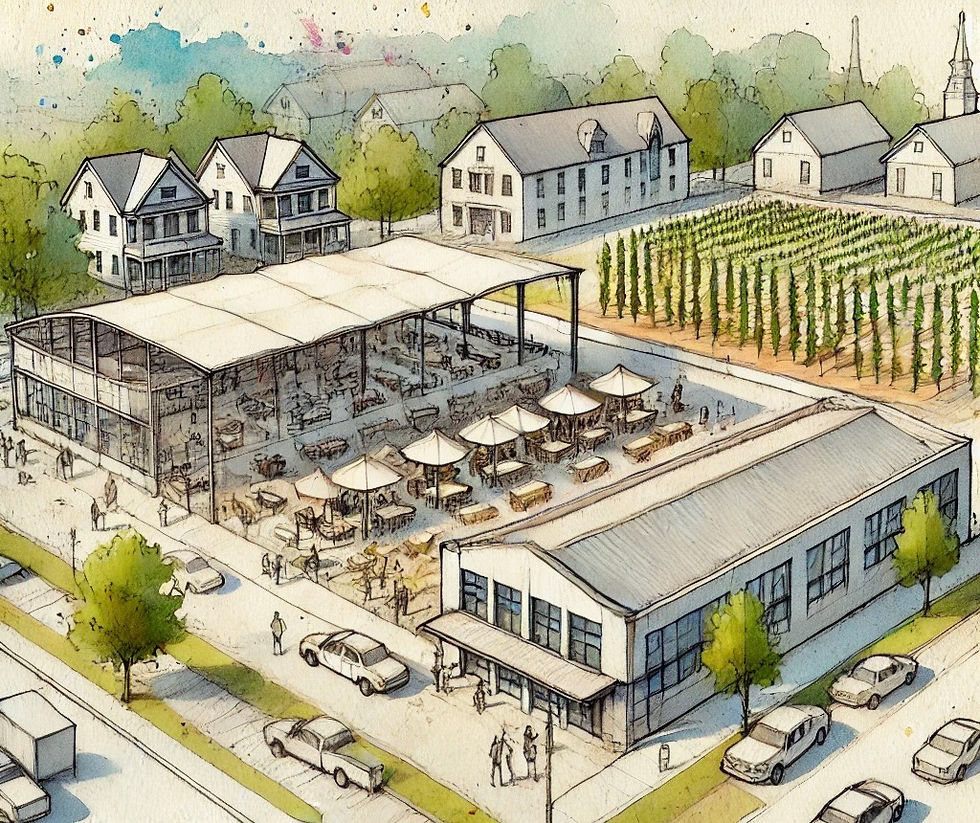



More information on this project



.png)







.png)


















